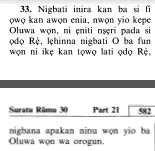30vs33
Select any filter and click on Go! to see results
وَإِذَا مَسَّ النَّاسَ ضُرٌّ دَعَوْا رَبَّهُم مُّنِيبِينَ إِلَيْهِ ثُمَّ إِذَا أَذَاقَهُم مِّنْهُ رَحْمَةً إِذَا فَرِيقٌ مِّنْهُم بِرَبِّهِمْ يُشْرِكُونَ
Waitha massa alnnasa durrun daAAaw rabbahum muneebeena ilayhi thumma itha athaqahum minhu rahmatan itha fareequn minhum birabbihim yushrikoona
Click to play
Yoruba Translation

Hausa Translation
Kuma idan cũta ta shãfi mutãne, sai su kirãyi Ubangijinsu, sunã mãsu mai da al´amari gare Shi, sa´an nan idan Ya ɗanɗana musu wata rahama daga gare Shi, sai gã wani ɓangare daga gare su sunã shirki da Ubangijinsu.
Asbabu n-Nuzuul (Occasions of Revelation)
How man sways between Tawhid and Shirk, and between Joy and Despair, according to His Circumstances
Allah says:
وَإِذَا مَسَّ النَّاسَ ضُرٌّ دَعَوْا رَبَّهُم مُّنِيبِينَ إِلَيْهِ ثُمَّ إِذَا أَذَاقَهُم مِّنْهُ رَحْمَةً إِذَا فَرِيقٌ مِّنْهُم بِرَبِّهِمْ يُشْرِكُونَ ﴿٣٣﴾
And when harm touches men, they cry sincerely only to their Lord, turning to Him in repentance; but when He gives them a taste of His mercy, behold, a party of them associates partners in worship with their Lord.
Allah tells us that when man is in dire straits, he calls upon Allah alone with no partner or associate, then when times of ease come and they have the choice, some people associate others with Allah and worship others alongside Him.
يقول تعالى مخبرا عن الناس إنهم في حال الاضطرار يدعون الله وحده لا شريك له وأنه إذا أسبغ عليهم النعم إذا فريق منهم في حالة الاختيار يشركون بالله ويعبدون معه غيره .
"وإذا مس الناس" أي كفار مكة "ضر" شدة "دعوا ربهم منيبين" راجعين "إليه" دون غيره "ثم إذا أذاقهم منه رحمة" بالمطر
أي قحط وشدة
I'raab - grammatical analysis of the Qur'an
الواو حرف استئناف «وَإِذا» ظرفية شرطية غير جازمة «مَسَّ النَّاسَ» ماض ومفعوله «ضُرٌّ» فاعل مؤخر والجملة في محل جر بالإضافة. «دَعَوْا» ماض وفاعله «رَبَّهُمْ» مفعول به والجملة جواب الشرط لا محل لها «مُنِيبِينَ» حال «إِلَيْهِ» متعلقان بما قبلهما «ثُمَّ» حرف عطف «إِذا» ظرفية شرطية غير جازمة «أَذاقَهُمْ» ماض ومفعوله والفاعل مستتر والجملة في محل جر بالإضافة «مِنْهُ» متعلقان بالفعل «رَحْمَةً» مفعول به ثان «إِذا» الفجائية «فَرِيقٌ» مبتدأ «مِنْهُمْ» صفة فريق «بِرَبِّهِمْ» متعلقان بما بعدهما «يُشْرِكُونَ» مضارع مرفوع والواو فاعله والجملة الفعلية خبر المبتدأ والجملة الاسمية جواب شرط غير جازم لا محل لها
